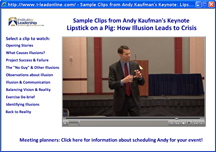
Thursday, April 18













|
Home > Leadership in the Real World Blog | |
|
Notes, links, and inspiration about topics related to personal and leadership development. |
|
|
| |
"Ignorance keeps you perky"Earlier this year Peggy Noonan wrote an article about President Obama's new term: "Every new president starts out fresh, in part because he doesn't know what he doesn't know. Ignorance keeps you perky."The months since have shown that running a government is more challenging than running a campaign. Though you and I are not seeking to be the leader of the free world, Noonan's point can be translated to those who strive to deliver projects and lead teams. When we first take over a project or team, our optimism may be based on ignorance. What is it that we don't know? This all comes to mind as I prepared for my podcast interview next week with Michael Roberto, author of Know What You Don't Know: How Great Leaders Prevent Problems Before They Happen. In the book, Professor Roberto essentially tells us that leaders must first hone their skills as problem-finders, not just problem-solvers. He offers very practical advice on how leaders can overcome the many barriers that make it a challenge to discover problems earlier instead of reacting to them later when the consequences can be much more severe. The podcast episode is not scheduled to be published until late October but I invite you to get your copy of Michael's book now and enjoy the interview when it comes out. In addition, here's an article that Michael just recently published that will give you a taste for what's in store. Here's to us all becoming better problem-finders! Labels: Books I Love, conflict, crisis, denial, illusion, podcast, project management, project sponsors, risk management
| |
Strategic Misrepresentation?I was doing some research today on project cost overruns. Unfortunately, there is no shortage of high-profile examples of massive project failures when it comes to cost.I was particularly intrigued by an article entitled "Underestimating Costs in Public Works Projects: Error or Lie?" by Bent Flyvbjerg, Mette Skamris Holm, and Søren Buhl. Just the term underestimating instead of overrun caught my eye.  Yet even more interesting was a conclusion they put forward in their paper: "Cost underestimation cannot be explained by error and seems to be best explained by strategic misrepresentation, i.e. lying." Yet even more interesting was a conclusion they put forward in their paper: "Cost underestimation cannot be explained by error and seems to be best explained by strategic misrepresentation, i.e. lying."Strategic misrepresentation? That could be the most creative way of saying lying that I've heard in quite a while! "In case after case, planners, engineers, and economists told Wachs that they had had to 'cook' forecasts in order to produce numbers that would satisfy their superiors and get projects started, whether or not the numbers could be justified on technical grounds...." As we discuss in our project management workshops, reality has this annoying way of always winning. Bad news doesn't get better over time. If your project is struggling, rather than trying to find creative ways to cook up a batch of strategic misrepresentation, how about applying that creativity into innovative solutions to get back on schedule. We-can-make-this-up: 5 of the most dangerous words in project management. It's not that you can't. It's just that hope is rarely a good strategy. And that's what we see way too often. Check out our Lipstick on a Pig: How Illusion Leads to Crisis keynote. It's perfect for a company meeting, retreat, or association gathering. We can help your teams learn to lead and deliver. Labels: accountability, crisis, denial, illusion, keynotes, risk management
| |
The Tech Disaster AwardsI enjoyed reading Jake Widman's recent article about The Tech Disaster Awards: What You Can Learn from ITs Biggest Project Failures.Maybe it's just a relief that none of the listed belong to me or any of my clients! Regardless, the reason I invite you to read it is that even the big failures have lessons that can be drawn from them. Do we really need to be reminded that it's important to know what we're building before we start cutting code? Apparently so.  Enjoy the article. As a next step, here's a suggestion: Click here (or on the image to the right) to view a related clip from our popular Lipstick on a Pig keynote. Watch for the clip entitled Project Success and Failure. It has some valuable insights to help you and your team understand what leads to project failure (and how to better set your project up for success). Enjoy the article. As a next step, here's a suggestion: Click here (or on the image to the right) to view a related clip from our popular Lipstick on a Pig keynote. Watch for the clip entitled Project Success and Failure. It has some valuable insights to help you and your team understand what leads to project failure (and how to better set your project up for success).Here's to no Ig Nobel awards in your future! Labels: crisis, Information Technology, learning, Lipstick on a Pig, project management
| |
How the Conflict in the Taxi Ended In a recent newsletter I related a true story of conflict that happened in a taxi on a cold night in Boston. If you haven’t read the story, click here to read it before continuing (it takes 2 minutes or less). In a recent newsletter I related a true story of conflict that happened in a taxi on a cold night in Boston. If you haven’t read the story, click here to read it before continuing (it takes 2 minutes or less).So, how did I respond when the driver spewed, “No! You said Hampton Inn at the airport!” I first took a deep breath to keep from lashing out. After all, my family was in the backseat and it was important that I not do anything that puts them in danger. I knew that more than my (now nervous) wife was in the back seat. Three little ones were watching what Dad was going to model. I looked into the driver's eyes, replied firmly but respectfully, “No, I said Monsignor O’Brien Highway. Take us to the Hampton Inn on Monsignor O’Brien Highway, now.” He wasn’t happy but he did take the next right turn. We were suddenly in a dark, rough looking neighborhood that I’m sure didn’t do much to settle my wife’s nerves! I pulled out my cell phone and called our hotel. In a voice loud enough to make sure the driver heard, I asked the front desk approximately how expensive a taxi fare from our origination to the hotel should cost. I repeated the answer out loud, “Did you say $15? Thank you.” The taxi fare was already over $20, with at least 10 minutes to go. As if I thought he hadn’t heard me (you never know with this driver!), I calmly but firmly told him, “I will be paying you $15 for this trip.” I didn’t have to speak his language to understand the essence of what was said under his breath. I didn’t respond. We were never so happy to see a Hampton Inn. The family poured out of the backseat with a collective sigh. The driver knew he wouldn’t get his $35 taxi. Much to his surprise, I pulled out a $20 bill and told him to keep the change. A bit stunned, he responded, “I’m sorry for the mistake.” Not all conflict ends quite this amicably. Enjoy it when it does. Though I don’t naturally use a Competing conflict style often, a controlled version of it worked in this case, followed by a Compromising pay out at the end. We can help you learn to manage conflict with more confidence. Our Beyond the Rock and the Hard Place can be delivered in a keynote, workshop, or e-learning formats. Click here for more information. Labels: Beyond the Rock and the Hard Place, conflict, crisis, influence, leadership
| |
Leadership Lessons from Howard TullmanCrain's Chicago Business recently posted a short video from Howard Tullman that I recommend you take the time to watch. I appreciate the clarity in which he communicates the essence of what it means to lead. Though his lessons are tuned for entrepreneurs, they can easily apply to anyone who leads, whether a team, a department, or an entire company.Key lessons to highlight include:
I commend Mr. Tullman's video for your viewing pleasure and personal development. Labels: anxiety, Beyond the Rock and the Hard Place, conflict, crisis, executives, leadership, managing change, mistakes, recommended sites, strategy, teams, uncertainty
| |
Silence is deadly (for projects and teams)If you've been around projects long enough you know the drill... There are real problems being encountered but everyone above you seems to either be unaware or uninterested in grappling with them. Denial is a powerful defense mechanism but rarely an effective project management strategy. Denial is a powerful defense mechanism but rarely an effective project management strategy.Eventually there's a project crisis. Rinse and repeat. Since we regularly help organizations deal with issues related to these, I was pleased to read some recent results from research performed by VitalSmarts and The Concours Group. They surveyed more than 1,000 executives and project management professionals across 40 companies in a wide variety of industries. Their Silence Fails study found direct correlations between our willingness and ability to speak up about issues and how successfully we deliver projects. The five most lethal issues that don't get discussed are:
Does your team or organization struggle with these issues? Contact us today about our Lipstick on a Pig: How Illusion Leads to Crisis in Real World Projects keynote. It's perfect for a company meeting, offsite, or retreat. We discuss these dynamics in more detail, including practical ideas about how to break out of the rut of failure caused by illusion. Contact us today for more information. Labels: crisis, denial, Lipstick on a Pig, planning, project management, project sponsors, risk management, teams
| |
Leaky Decisons: Illusions that Led to the Great Chicago Flood CrisisOur Lipstick on a Pig keynote is based on an insightful quote by Jerry Weinberg: "It may look like a crisis, but it's only the end of an illusion."For those of us who have a passion for getting things done, delivering projects, and leading people, there are powerful lessons to be learned by exploring the illusions we face. Charles Leroux provided an entertaining and insightful look (Chicago Tribune link no longer available) into a crisis that gripped the Chicago area: the Great Flood of 1992. It clearly illustrates how illusions led to the crisis that cost the area an estimated $800 million. Do you have an upcoming company or department meeting that would benefit from an entertaining, business-focused keynote? Give us a call to get our Lipstick on a Pig keynote added to your meeting agenda! Labels: crisis, culture, illusion, keynotes, Lipstick on a Pig |
|
|


